
Israel
For a full scale picture, please click on the picture shown !
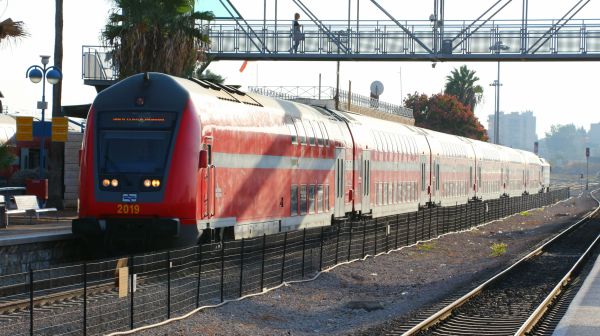
Israel is a small country with a well developed train network, but the
network unfortunately does not reach to the south of the country. The trains are familiar western European models somewhat
modified to suit the extremely hot temperatures in Israel. Haifa, Tel Aviv and Lod are among the busiest railroad stations.
Tel Aviv has three major stations.
This picture shows a very typical Israeli passenger train composed of doubledecker coaches made by Bombardier in Germany.
Up to the coloring they are almost identical with similar German trains. But have a look at the steering cab coach: The
front half is not for passengers like in Germany, but contains a large diesel aggregate to produce electricity and thus
cooling even when there is no locomotive at the other end of the train. Photo in Lod 6.11.2016 by Moshe Itzhakov.
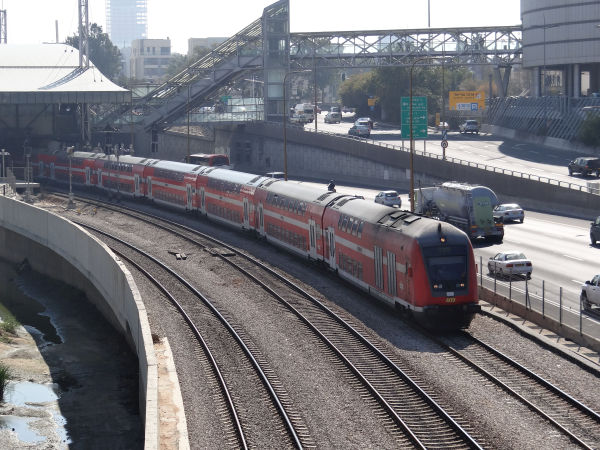
A typical Israeli doubledecker train just being pushed out of the Hashalom station in Tel Aviv. Picture 19.2.2014 by Ilkka
Siissalo.
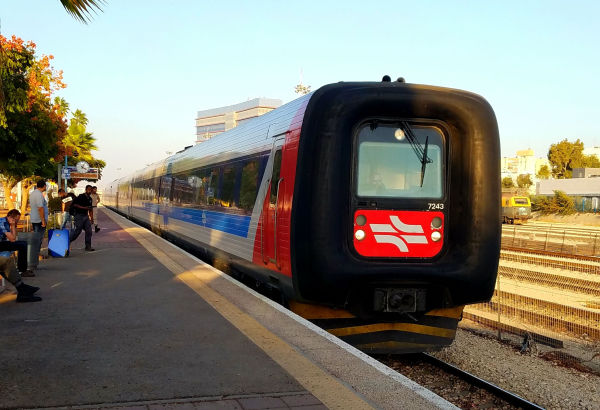
These "rubberface" diesel trains are also very typical of Israel. The model is made by Kalmar Industries in Sweden and is
practically identical to Danish state railways DSB's IC3 trains. Israel Railways bought a batch of these second hand from
Swedish state railways SJ in Sweden and has used this type for example in traffic between
Tel Aviv and Jerusalem. Picture in Lod 6.11.2016 by Moshe Itzhakov.
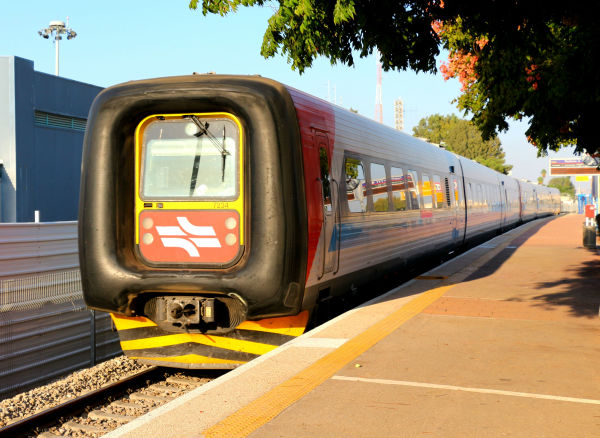
Another view of a rubberface diesel, this time no. 7234 in Lod. Picture 6.11.2016 by Moshe Itzhakov.
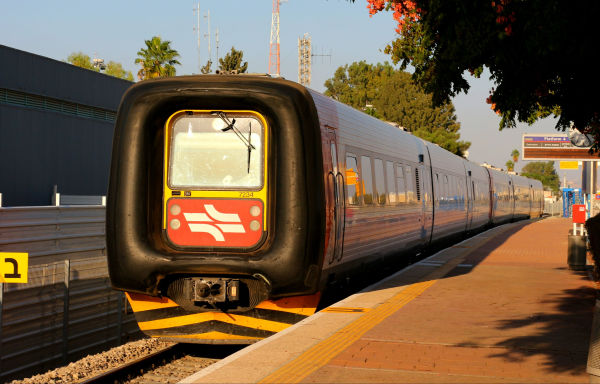
Another view of the same rubberface diesel no. 7234 in Lod. The train is actually made of two units, each three coaches long,
just like the typical Danish IC3 trains are. Picture 6.11.2016 by Moshe Itzhakov.
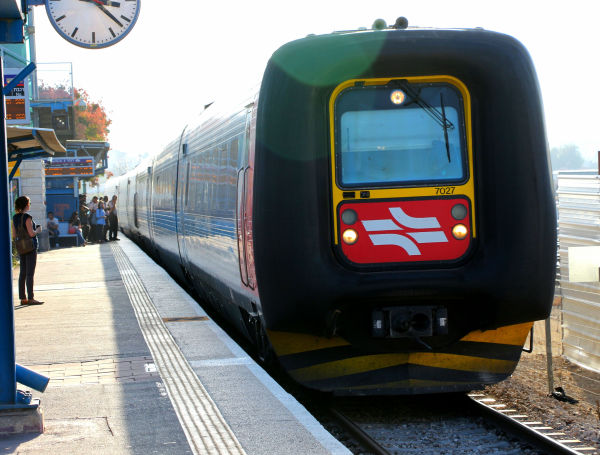
Yet another rubberface diesel, no. 7027 in Lod. Picture 6.11.2016 by Moshe Itzhakov.
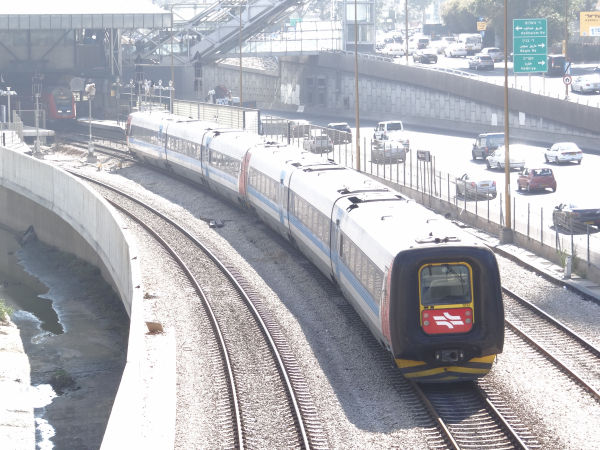
A rubberface IC3 train composed of two three car units is approaching the Hashalom station in Tel Aviv. Picture 19.2.2014 by
Ilkka Siissalo.
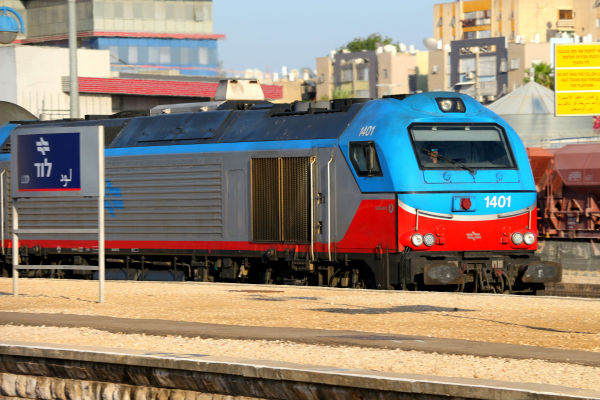
This is one of the newest and strongest locomotives in Israel. It is a Euro 3000 engine made by Vossloh Espana, now Stadler Rail
Spain. The model is quite popular and is in use from the arctic circle in Norway in the north to the South African railways in the
south (There the modified version is called Afro 4000). This is the four axle version Euro 3000. The more common six axle version
spread all around Europe is called Euro 4000. Israeli railways uses its Euro 3000s especially in heavy cargo trains,
but also with doubledecker coaches in passenger traffic. Picture in Lod 6.11.2016 by Moshe Itzhakov.
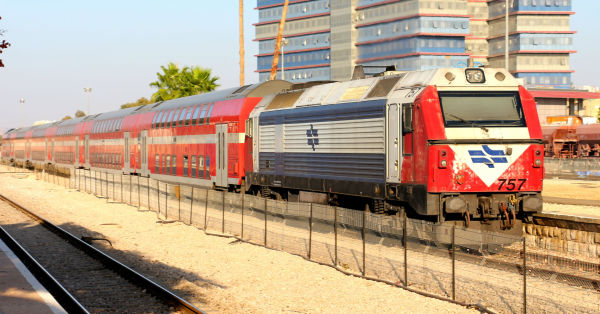
This locomotive no.757 is a model JT 42BW built by Alstom in Spain between 1996 and 2006. They were actually made in the same factory
than the newer Euro 3000 locomotives, but by then the factory was owned by Alstom, then by Vossloh and now by Stadler. These machines
have US built diesels made by EMD. 48 of these were delivered to Israel Railways and they have been used mostly with push-pull
passenger traffic trains. Picture 6.11.2016 in Lod by Moshe Itzhakov.
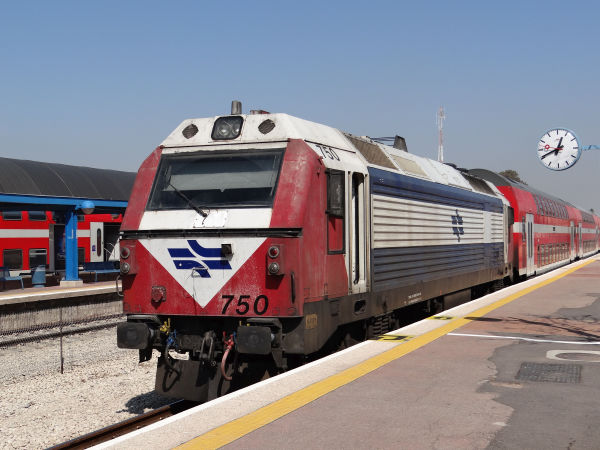
Another view of a similar Alstom JT 42BW but this time no. 750. The strong UV radiation has caused some of the paintings to fade out.
Picture in Lod 19.2.2014 by Ilkka Siissalo.
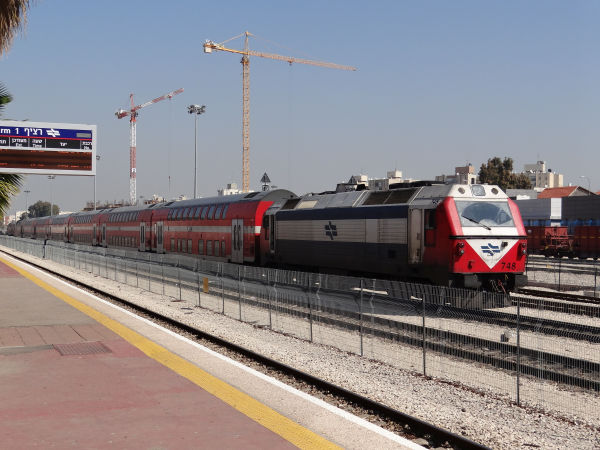
Yet a similar Alstom JT 42BW no. 748 with its typical Bombardier double decker coach set.
Picture in Lod 19.2.2014 by Ilkka Siissalo.
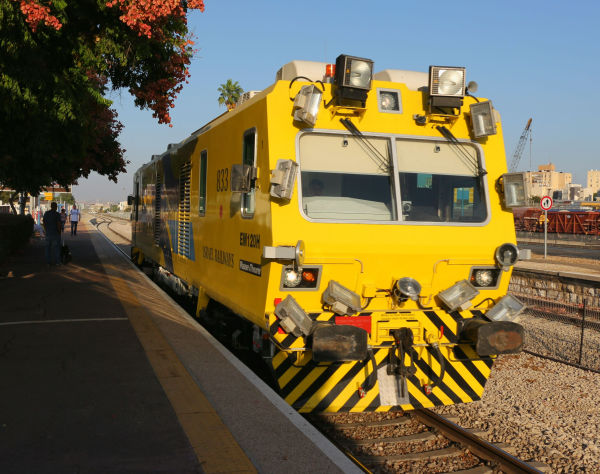
This Plasser & Theurer EM 120H is a track inspection vehicle built in Austria. It has a contactless track geometry measuring system.
It can monitor not only tracks, but also if there is too much or too little ballast or it can inspect tunnel walls.
This is a unique machine in Israel. Picture 6.11.2016 in Lod by Moshe Itzhakov.
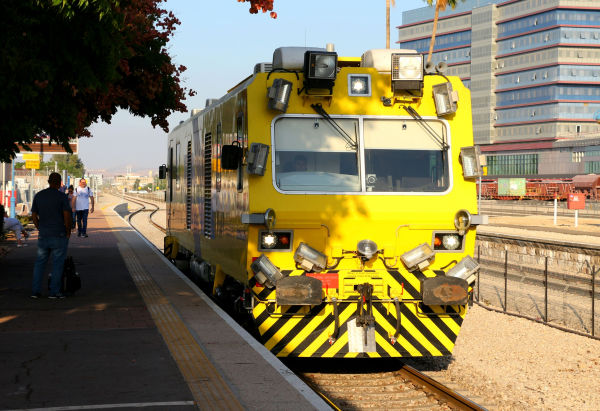
Another view of the Plasser & Theurer EM 120H. Note what an impressive array of lamps and fast video cameras it has in its front.
It can precisely pinpoint to the centimetres every fault it finds.
Picture 6.11.2016 in Lod by Moshe Itzhakov.
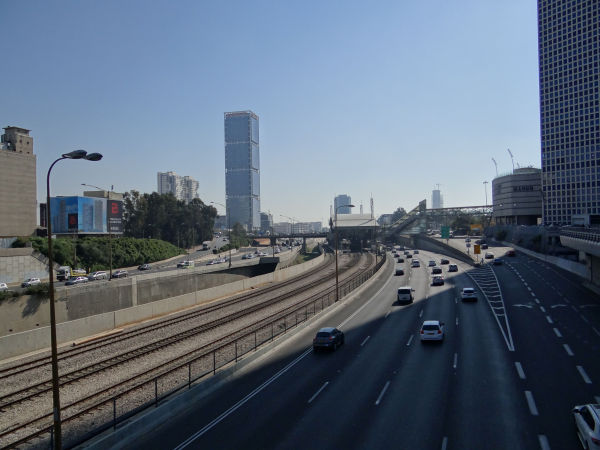
One of Tel Aviv's three major train stations is the Hashalom station close to the old arab settlement of Jaffa / Yafo.
It is connected to a modern western style shopping mall. Picture 19.2.2014 by Ilkka Siissalo.
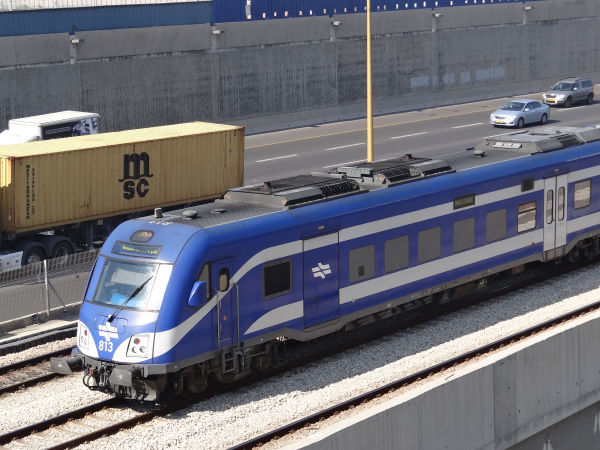
This is a Siemens built "Viaggio Light" steering cab coach. Siemens delivered to Israel Railways 2009-2011 87 plus 31 Viaggio
coaches capable of speeds up to 160 km/h. These sets also have diesel generator coaches to provide cooling irrespective of
if there is a locomotive or not available. Picture 19.2.2014 by Ilkka Siissalo.
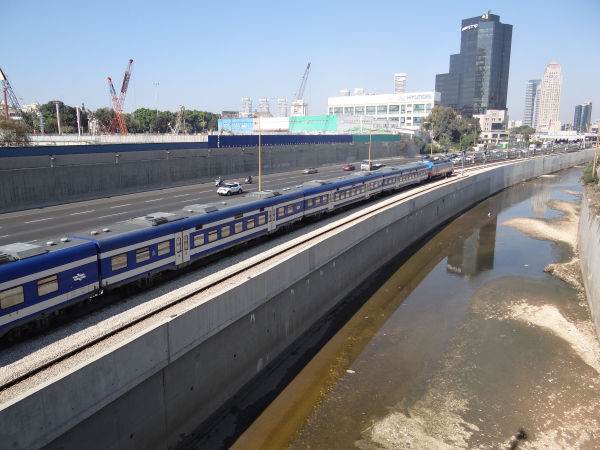
The other end of the same Siemens built "Viaggio Light" train as above. At the other end there is a pushing Euro 3000 new diesel.
Picture 19.2.2014 by Ilkka Siissalo.
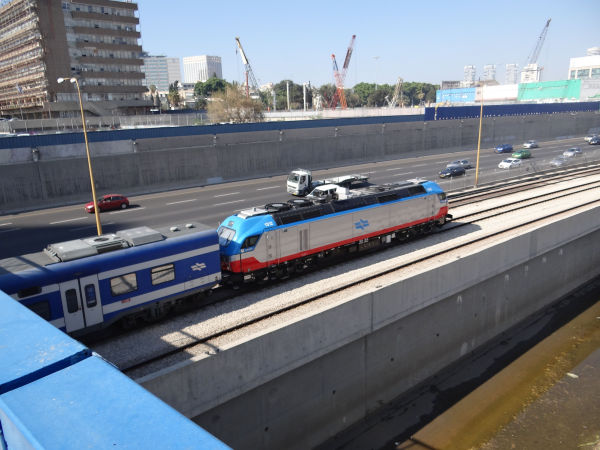
This is the Euro 3000 diesel at the other end of the same train as above.
Picture 19.2.2014 by Ilkka Siissalo.
Citypass light rail of Jerusalem
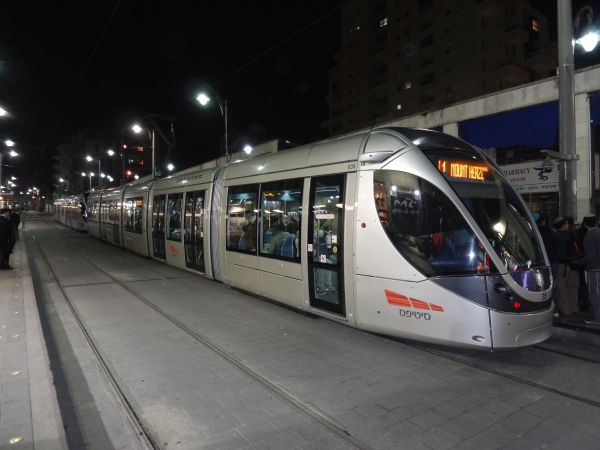
There is a modern light rail line through the city of Jerusalem, operated with French built Alstom Citadis trams. The system is called the
Citypass light rail. It runs from Mount Herzl to Heil Ha-Avir. It is a 1435 mm track system with 750V DC electricity. The line is 13,8 km long.
Typically the trains consist of two Citadis units, making it a really long train. The service was opened in 2011. Currently there is only one
line in operation, but several new ones are being planned. There are currently 46 trams of the type Citadis 302 working on the line.
Picture from Jerusalem near the Damascus gate 18.2.2014 by Sanna Siissalo.
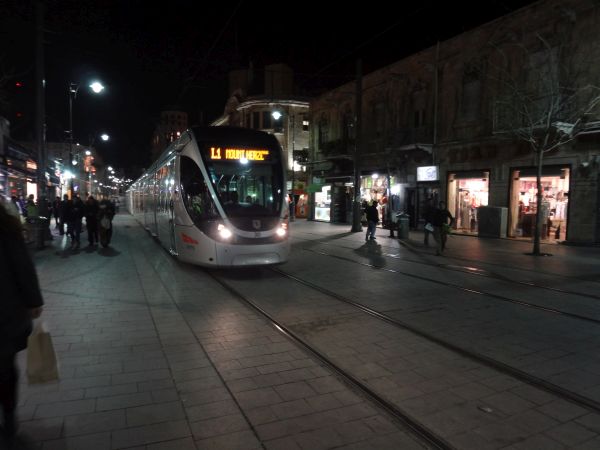
With a track width of 1435mm the Citypass Citadis trams are really wide.
Picture from Jerusalem near the Damascus gate 18.2.2014 by Sanna Siissalo.
The Carmelit subway funicular
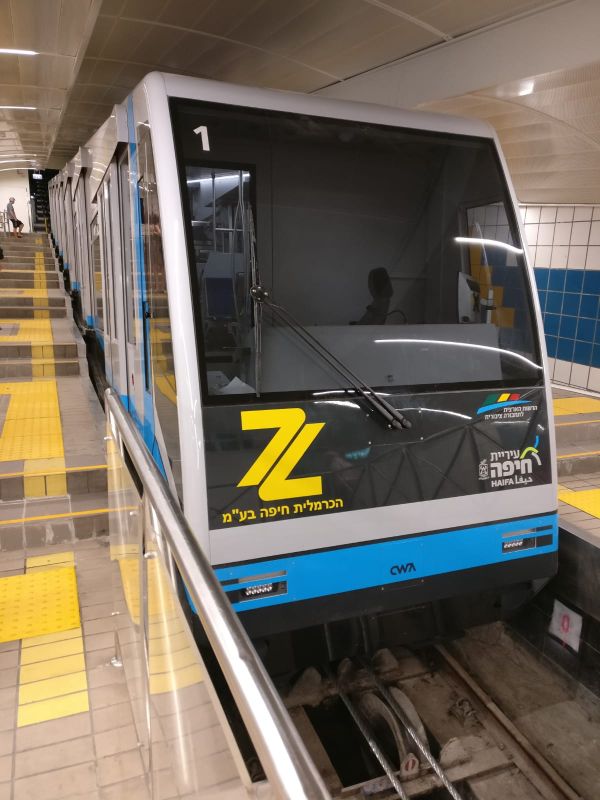
Israel's only totally underground train is this Carmelit lift. It's a funicular train which runs inside Mount Carmel from downtown Haifa up
to Carmel Center 237 meters higher up. The current trains have been built by Von Roll of Switzerland. The trains run on 1980 mm wide gauge rails.
Picture by Wikipedia user Oyoyoy 8.10.2018. Published under the
Creative Commons Attribution-ShareAlike 4.0 International license.

